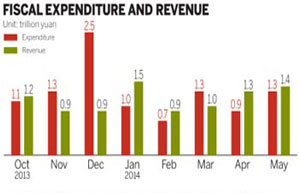China fiscal revenue rises 6.3%
(Xinhua) Updated: 2014-10-22 09:09BEIJING -- China's fiscal revenue rose 6.3 percent year on year to 995.3 billion yuan ($162.6 billion) in September, quickening from a 6.1-percent rise in August, the Ministry of Finance said on Tuesday.
|
 |

|
The pace of fiscal spending sped up. In September, national fiscal expenditures went up 9.1 percent to 1.4 trillion yuan, compared to the 6.2-percent increase in July.
In the first nine months, fiscal revenue rose 8.1 percent to 10.6 trillion yuan, according to the ministry.
In the Jan.-Sept. period, fiscal revenue collected by the central government fell short of the budgeted full-year growth rate of 7 percent, expanding 6 percent year on year to 4.96 trillion yuan, while revenue for local government increased 10.1 percent to 5.68 trillion yuan.
From January to September, spending by the central government went up 11.8 percent to 1.6 trillion yuan, and spending by local governments rose 13.5 percent to 8.8 trillion yuan.
The monthly growth rate of China's fiscal revenue remained at a relatively low level compared to the double digit growth that became the norm for much of the past couple of decades.
"The growth momentum of the fiscal revenue is in line with the overall economic situation in the country," said Bai Jingming, vice director of the Research Institute for Fiscal Science under the finance ministry.
China's gross domestic product (GDP) grew 7.3 percent in the third quarter this year, marking the slowest quarterly growth since the first quarter of 2009, official statistics also showed on Tuesday.
In a statement on its website, the ministry attributed the weak growth in central government revenue to "the relatively low growth rate in export rebates, domestic value-added tax and tax deriving from imports."
Regarding the lukewarm performance of local governments' fiscal revenue growth -- slower than in the same period last year, the ministry said the bearish property sector was mainly to blame.
The ministry said it expects the central government to experience difficulties in boosting fiscal revenue and the growth of local governments' fiscal revenue to further slow in the fourth quarter.
It attributed the dim prospects to "economic downward pressure, more tax cuts under the program to replace business tax with VAT, and the high comparison base of the last year."
- China's family companies bullish on business outlook
- Quality, sustainable growth the priority
- Students design and assemble a car from scratch
- Top 10 cities with highest rents in China
- Report: Mobile advertising on a roll
- Li upbeat despite economic slowdown
- Manchester investment portfolio launches in Beijing
- Financial opening should top Shanghai FTZ reform agenda















